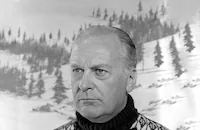Psyche 59

Brief Synopsis
Cast & Crew
Alexander Singer
Patricia Neal
Curt Jurgens
Samantha Eggar
Ian Bannen
Beatrix Lehmann
Film Details
Technical Specs

Synopsis
Allison has been blind since a fall 5 years earlier during a pregnancy. Doctors have decided that her blindness is psychosomatic, induced by the desire to forget a traumatic event in her past. Allison's younger sister, Robin, arrives in London for a visit, much to the annoyance of Eric, Allison's industrialist husband. Robin begins seeing Paul, a family friend who is in love with her, but Allison senses a curious tension between Eric and Robin. Later, Eric tells Paul that he seduced Robin when she was a schoolgirl, and Robin admits that she is still attracted to Eric. Allison's sight begins to return following a fall in the garden, but she hides the fact. After Robin announces her intention to marry Paul, Allison discovers Robin and Eric embracing. She remembers that her earlier fall and blindness resulted from seeing her husband and sister in a similar situation. Paul leaves Robin, and Allison abandons Eric.

Director
Alexander Singer
Cast

Patricia Neal

Curt Jurgens

Samantha Eggar

Ian Bannen
Beatrix Lehmann

Elspeth March
Sandra Lee
Shelley Crowhurst
Peter Porteous
Gladys Spencer
Michael Mcstay
Crew
Max Benedict
David Bracknell
Pamela Carlton
R. L. M. Davidson
Robert Ellis
Harold Fletcher
Julian Halevy
Julie Harris
Len Harris
Phillip Hazelton
Kenneth V. Jones
Walter Lassally
Red Law
James Liggat
Josie Macavin
Romek Marber
Laura Nightingale
George Stephenson
John Stoll
Peter Thornton
Pearl Tipaldi
Frank Willson

Film Details
Technical Specs

Articles
Psyche 59
A late entry in the wave of Freudian-inspired psychological dramas made popular in the 1940's (most prominently with Alfred Hitchcock's Spellbound, 1945), Psyche 59 (1964) places the root of its heroine's problems squarely with a psychosomatic deprivation of the senses brought about by emotional/sexual trauma, which later became the pivotal device of The Who's Tommy (1975). Adapted from a soapy French thriller by Françoise des Ligneris, the script by Julian Zimet (writing as "Julian Halevy") downplays its suspense aspects for the most part, instead focusing on the increasingly tense dynamic between the main triangle of characters. Similarly, Zimet would bring more character orientation than expected to his purer genre efforts like 1965's Crack in the World and 1973's Horror Express (not to mention his odd 1971 British zombie-biker film, Psychomania).
American director Alexander Singer only had one feature film under his belt, 1961's steamy independent hit with Lola Albright, A Cold Wind in August, and he shoots this film with a similarly chilly black-and-white clarity coupled with a precise understanding of his lead actress' ability to suggest turmoil and longing beneath a classically beautiful exterior. This technique would serve him well the following year with his last film of the decade (and his first in color), Love Has Many Faces (1965), with Lana Turner being put through the usual soap opera paces.
As the unfaithful mustachioed husband, Bavarian-born Jürgens was already familiar to international viewers thanks to his roles in Roger Vadim's scandalous And God Created Woman (1956), The Inn of the Sixth Happiness (1958), and dozens of German films dating back to the mid-1930s. However, he also earned some renown in the theatrical community for his imprisonment in a Nazi concentration camp in 1944 due to his political dissent expressed in the Viennese theatrical community. The least-known of the three leads, Eggar had only been acting for two years at the time of filming with only one significant film role, playing opposite Dirk Bogarde in Doctor in Distress (1963). Her alluring performance here proved to be just a taste of things to come as she became a bona-fide star (though briefly) the following year with her powerhouse appearance in William Wyler's The Collector (1965). According to Neal's personal correspondence, she and Eggar had a chilly relationship at first but eventually grew to become close friends.
However, the primary attraction for this film is Neal herself, an actress able to lend gravity to even the most dubious storylines. Pregnant at the time of filming with her fourth child, Neal was still enjoying critical acclaim for her performance opposite Paul Newman in Hud (1963) and finding herself in demand. At the same time, she was experiencing some distress at home with her husband, writer Roald Dahl, following the death of their daughter, Olivia, and an extensive series of craniotomies performed on their son, Theo.
Though Neal's performance was almost universally praised, Psyche 59 seemed to confound critics, with Film Daily labeling it "too obvious for art house tastes and too torrid for the general audience," no doubt owing to a surprising amount of revealed flesh for 1964. In her autobiography, As I Am,, Neal herself seems to resent the film (mainly for causing her to miss out on the lead role in The Pumpkin Eater [1964] which went to Anne Bancroft) and dismisses it as "not a particularly happy experience and it was a forgettable film. I should have taken my chances and waited." However, Stephen Michael Shearer's biography, Patricia Neal: An Unquiet Life, appraises it as "a strange, haunting melodrama that was rather ahead of its time with its adult themes."
Producer: Philip Hazelton
Director: Alexander Singer
Screenplay: Julian Zimet, Francoise des Ligneris
Cinematography: Walter Lassally
Film Editing: Max Benedict
Art Direction: John Stoll
Music: Kenneth V. Jones
Cast: Curd Jurgens (Eric Crawford), Patricia Neal (Alison Crawford), Samantha Eggar (Robin), Ian Bannen (Paul), Beatrix Lehmann (Mrs. Crawford), Elspeth March (Madame Valadier).
BW-94m. Letterboxed.
by Nathaniel Thompson

Psyche 59
Quotes
Trivia
Notes
Released in Great Britain in 1964; running time: 94 min.

Miscellaneous Notes
Released in United States 1964
Released in United States Winter January 1, 1964
Released in United States 1964
Released in United States Winter January 1, 1964














